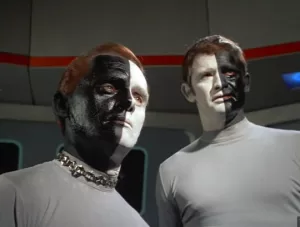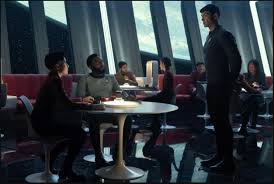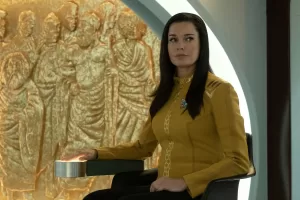When I go on Twitter these days, I am always immediately reminded that there are about a million better things I could do with my time. Things like, for example, slamming my hand in a car door repeatedly.
One reason I feel this way is because I always run into some jabroni whining about “WhEn DiD sTaR tReK gO WOKE?!?!?” because of the black woman captain on Discovery or the Strange New Worlds editing images of the Jan. 6 insurrection into a montage of Pike describing civil unrest on earth.
And the answer, of course is 1966.

Gene Roddenberry always envisioned the show as a way to discuss the issues of the day through the lens of science fiction. And Trek has ALWAYS used that as a springboard to discuss social issues.
Some lunkhead on Twitter pushed back that Star Trek USED to put those messages subtly into a story, rather than ram it down your throat. I replied by asking what exactly was subtle about the half-black, half-white aliens being used as an allegory for racism in “Let That Be Your Last Battlefield”?

And the Next Generation episode “The Outcast” — where Riker falls in love with a hermaphroditic alien who decides to present as female — was that a subtle allegory about LBGTQ+ issues?

Of course not. These were as a subtle as a sledgehammer. But sometimes that’s what you need to get through to people.
Which brings us to this week’s episode of Strange New Worlds, “Ad Astra per Aspera.” The Latin phrase translates as “To the Stars, with Difficulty,” and it’s a metaphor for Una Chin-Riley’s struggles. She is on trial for the crime of hiding her genetic augmentations from the Federation. After the mass slaughters of the Eugenics Wars, Starfleet has banned all people with modified DNA, including Illyrians who get augmentations in utero.
The episode starts off with a flashback to Una as a child. She has a broken leg and is listening to her parents argue about taking her to the hospital. “They’ll do tests! She’ll be found out!” And it is impossible to hear that dialogue and watch that scene and not think about the cruel anti-trans laws being gleefully passed by Republican-controlled states, laws that classify parents of trans kids as child abusers and empower the state to take their kids away. I can’t imagine letting your child suffer an injury because getting them treatment would make things worse.
Back in the present, Una is being given a plea offer by Captain Batel (Melanie Scrofano). Plead guilty to falsifying documents, you’ll get no jail time, your record will be sealed, and you’ll be dishonorably discharged. Her defense council, who is from Starfleet, urges her to take it. But Una refuses. A discharge and a sealed record will make it seem like her time in Starfleet never happened, and she is not going to help them sweep her under the rug.
Pike has taken it upon himself to recruit Neera (Yetide Bataki), a childhood friend of Una’s and fellow Illyrian who grew up to be a civil rights lawyer. They had a falling out, though, and Neera hasn’t spoken to Una in years. She is on a planet in the Vaultera Nebula that is unfit for human life, but Illyrians can live there due to there genetic modifications. He is refused entrance to Neera’s office, but is quite willing to sit there and wait, even if his oxygen tank runs out. Neera finally relents and creates an oxygen atmosphere in her office for Pike, but just so she can tell him no. (Has she met Pike? That’s not going to work!) She is extremely reluctant to help in what looks like a no-win case, but Pike appeals to her legal efforts. She’s brought ten anti-discrimination cases against the Federation in two years, all dismissed for lack of evidence. If she can win a highly publicized case like this, then it could help establish precedent for other cases she brings for Illyrians. Reluctantly, Neera agrees.

She gets to the Starfleet JAG office just in time for Una’s arraignment, but there’s a new wrinkle. Instead of just facing the sympathetic Captain Batel (who is also Pike’s friend), her supervisor, the Vulcan Vice-Admiral Pasalk has joined the case. And since Una rejected the plea deal, he’s going to make an example of her by adding two counts of sedition and asking for 20 years on a penal colony.
Pasalk is a friend of Sarek, Spock’s dad, which leads to the funniest moment of the season so far. Spock and Pasalk are having dinner on the Enterprise and are being closely watched by M’Benga and Ortegas. Ortegas is imagining their conversation. “‘Sorry to have to send your friend and co-worker to jail for 20 years.’ ‘Do not worry, it is only logical.'” M’Benga scoffs, saying it’s obvious from their body language that the two of them hate each other. Ortegas is befuddled, since the two Vulcans are sitting perfectly still and not saying a word. Then Spock gets up, adjusts his shirt and strides over to M’Benga and Ortegas. “I am sorry you had to witness that outburst.” Of all his father’s colleagues, Pasalk brings out the worst in him. It’s a perfect deadpan, and a reminder that one reason this show is so good is that it remembers that Star Trek can be funny. And between this and last week’s “I would like the ship to go,” Ethan Peck is fast establishing Spock as a stealthy comic relief character.

Meanwhile, Una is desperate to testify in her own defense, but Neera shoots that idea down. I may not know fancy space law, but I’ve watched enough Law & Order to know that testifying in your own defense can only lead to trouble. (I’ve also watched enough legal dramas to know that once that idea is planted, events will conspire to force Una to take the stand in the most dramatic fashion possible.) Neera outlines their strategy. They can’t argue the law, since the law is clear: augmented individuals cannot join Starfleet. Instead, Neera will argue that the law is unjust and discriminatory, and therefore should be disregarded.
After all, Starfleet certainly doesn’t have a problem with disregarding laws when they find them inconvenient! Neera gets Admiral April to admit as much. After giving a glowing report on Una’s ability and character, he admits that he would not have recruited her for Starfleet had he known she was Illyrian. After all the law is clear on that point. Oh, says Neera, as clear as your beloved Prime Directive? Neera then proceeds to describe the many, many times the Admiral disregarded the Prime Directive in order to save lives and even entire planets from disaster by blatantly interfering in pre-warp societies.
And good for Neera! Trek loves to trot out the idea of how they would never interfere with primitive civilizations, yet somehow Captain Kirk is always being worshiped as a god before the end of an episode.
Did the admiral get punished for this, asks Neera, or did he get rewarded? The admiral hems and haws while Neera states that this shows that Starfleet doesn’t really care about their precious laws, they just want an excuse to discriminate against Illyrians. And her comments certainly bring to mind Wilhoit’s Law. “Conservatism consists of exactly one proposition, to wit: There must be in-groups whom the law protects but does not bind, alongside out-groups whom the law binds but does not protect.” Una, Neera, and the Illyrians are the out-group, being bound by unjust laws.
While the trial is going on, Lieutenant La’an Noonien-Singh is desperately trying to find out who turned in her friend and mentor Una. She is worried that it might have accidentally been her. When Una “came out” to her as Illyrian, she felt betrayed and angry that her friend had lied to her and made an entry about it in her personal log. Now, she’s worried that somehow someone got into her log and found that. She had tried to get Uhura to tell her all of the transmissions of personal logs from the ship, but Uhura refused. That would be highly illegal, and she reminds La’an that Una would not want her to get into even more trouble trying to help. Neera comments that it takes a ton of paperwork from a ton of admirals to access a personal log, and it usually takes about six months. There’s no way La’an is the source.
While La’an is happy to hear that, she still can’t figure out who turned Una in if it wasn’t via her log. Who would gain from getting Una arrested? This comment makes something click for Neera, who thanks La’an and then runs off to tell Una that she will be taking the stand after all. Hmmm… wonder if she’s got a plan….

Una’s testimony is about as heart wrenching as you’d expect. She tells of growing up in a Federation-aligned colony, which was only allowed to join if they upheld the No Modifications rule. This led to open persecution of Illyrians, people calling them slurs, barring them from stores, and then attacks. Una broke her leg trying to break up a fight where an Illyrian boy was being attacked, and might have died had her parents not found an Illyrian doctor. Eventually, the colony had to partition the city into two halves — Illyrian and non-Illyrian. Because Una’s family could “pass” as human, they went to the non-Illyrian side so their daughter could have better opportunities and not be stuck in a ghetto — even if that meant never seeing their friends and families again. (This is the source of the falling out between Neera and Una. Una got out, Neera didn’t.)
Neera asks her, in spite of all that, you still wanted to join Starfleet? Yes. When a Starfleet ship visited her colony, she was struck by how the crew was made up of all different races and species, all working together. (To very subtly hammer the message home, the camera here pans across the multi-racial crew of the Enterprise watching the trial on their version of Court TV.) Una drew inspiration the old Federation motto, “Ad Astra Per Aspera” — to the stars, with difficulties. It would be hard for her, but it would be worth it. And it was, until she got found out.
So who did turn Una in, asks Neera. Una admits that she did. She turned herself in because she was tired of living a lie and hiding because of prejudice. Neera’s hunch was correct.
This scene knows exactly what it’s doing. It is the classic Trek trope of explaining to you that prejudice is bad, and doing that with all the grace and gentleness of a suplex off the top rope. And it worked like gangbusters on me. Una spent 25 years in Starfleet and all of her good works — like saving La’an from the Gorn — are being pushed aside because of her biology.
Pasalk handles the cross, and he’s not impressed with these base appeals to emotion. Facts are facts, and the fact is she knowingly broke Starfleet’s rules to join. And did she ever tell her captain? Yes, she admits. Several months ago. This makes Pasalk positively gleeful. Well, then we may need to bring charges against him and whole crew since this sounds like a conspiracy!
Undeterred, Neera pushes on. Wow, Pasalk sure knows a lot about Starfleet rules, how about Starfleet Code 8514? This deals with Starfleet handling refugees. Neera helpfully reads how Starfleet defines a refugee as any person fleeing persecution or fearing for their life due to political or religious beliefs, cultural engagements, or biological truths (check) who seeks safety in Starfleet (check) and upon revealing themselves to authorities and making a request may be granted asylum. Starfleet captains must exercise discretion and judgment when offering asylum. (check). Una’s testimony established that she fulfilled all parts. She was persecuted for her biology, sought refuge in Starfleet, and then told her captain, who exercised his best judgement with regards to her position. So, since you all loooove laws so much you want to marry them, all Neera asks is that you accept the validity of Starfleet’s asylum rules and rule in her favor.
The tribunal seems positively delighted to have been offered a face-saving out and quickly dismisses the charges against Una. It’s not the rousing victory for equality and civil rights that Una and Neera were hoping for, but Una is back on the bridge and out of jail. And Pasalk got hoisted on his own logic petard, so hooray! Pike welcomes her back on board and they are off to new adventures!
Now, while I loved this episode, I have to say that Una’s plan to get arrested was half-cocked at best. It would’ve worked better if she had made contact with Neera beforehand and worked out a strategy rather than emailing Starfleet security and saying, “Oh forgot to mention, I’m an Illyrian!” I know, Neera was avoiding her calls, but Pike could’ve gone out sooner. And if claiming asylum was going to be the endgame all along, why not just start there? It’s not like Pike was unfamiliar with the concept. They were considering asylum for people from the planet where their energy supply comes from child torture. (S1 Ep6 “Lift Us Where Suffering Cannot Reach”) Still, even a Vulcan understands that logic must take a backseat to story structure at times.
And speaking of Vulcans, I would’ve liked to have seen a little more back story behind why Pasalk and Spock dislike each other so much. Sure, I bet that Pasalk views Spock as an emotional half-breed and Spock views him as a inflexible ass, but a scene with them having actual dialogue would be nice.
Still, those are minor things. This is Trek doing what Trek does best: using a sci-fi filter to highlight social issues. And it is also a solid critique of the Trek ethos as well as the liberal humanism it strives for. Trek has always presented itself as a world without prejudice that we should strive for, but there have always been blind spots. (Like female crew in miniskirts from Day 1). And it’s important to point those out and acknowledge that we haven’t been perfect. It’s how we grow as a people, and how Trek grows as a franchise.
Classic Call Backs: Of course, any trial on a Star Trek show is going to bring back memories of “The Measure of a Man,” where Picard passionately argues in favor of Data’s autonomy, and the parallels here are striking.
Random Notes: Letterkenny fans should note that the actress who portrays Captain Batel is also the randy Mrs. McMurray. Pitter-patter, let’s get at ‘er!
Rating: 4.5/5
